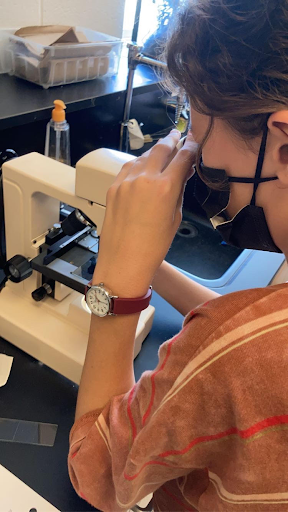
As freshman JD Peppelman arrives home from a grueling afternoon swim practice, he sets to work on his APEX biology lab report, with an APEX English paragraph, Algebra 2 and Latin homework looming over him.
Peppelman is one of many students in WJ’s signature academic program: APEX (Advanced Placement Experience). It was first implemented in fall of 1996, with the goal of being a program for students seeking academic challenge. Since then, the APEX program has undergone immense change, expanding in 2014 from 50 students to around 87 students (two classes to three classes).
In the 2020-2021 school year, however, APEX underwent a complete overhaul. APEX admissions were greatly expanded, admitting hundreds of students into the APEX program rather than the previous 87, while creating pathways which require students to take advanced level courses in specific subject areas. The increase in admissions have led to the current freshmen class having 225 students in APEX.
Implementation of Pathways
In one of the more prominent changes, APEX-Reach students are now required to complete at least one pathway, which is a series of honors and AP classes in a specific subject area. For example, students who choose to take the social studies pathway must take a combination of at least three classes from a list consisting of: AP Economics, AP Human Geography, AP Psychology, AP European History, AP Comparative Government or Sociology, requiring them to take an extra three AP classes across their sophomore, junior and senior years.
However, the addition of pathways to APEX-Reach means that students are required to choose a pathway in their underclassmen years and then must stick to the required classes of the pathway in order to graduate. “I think the pathways are a little restricting, because they don’t give you much freedom to select and take a variety of classes to experiment with different classes,” freshman Sarah Lin said.
Jaden Luskin, a freshman, qualified for the APEX program, but decided to not take it. “I’ll probably end up doing the same or similar AP’s but I don’t have to worry about the stress. Because I won’t be forced to do it, if it’s too much I can take a step back and do one less AP,” Luskin said.
Although all APEX students must complete at least one pathway before graduating, the pathways provide direction and structure for students. “It’s a path, as opposed to you or your family kind of shooting blind, saying ‘Hey I think this is an advanced class.’ [The pathways] give you a sense of what a challenging curriculum looks like,” APEX Reach co-coordinator Nathan Schwartz said.
Admission Process Changes
The most important change in APEX, however, is in the admission process. Whereas previously a long application process including a test, teacher recommendations and other submissions were required, now, the sole requirement to join APEX is to maintain a 3.5 GPA in 7th grade and the 1st quarter of 8th grade, and students who meet the requirement will be automatically accepted.
APEX Senior Nishi Tripathi recounted her APEX admissions process prior to the current changes. “We had to get a teacher recommendation, we submitted our extracurricular activities, and we had to come in and take a standardized test, with reading comprehension questions, and then we had to write an essay analyzing a speech,” Tripathi said.
This year, 9th grade students filled out a google form expressing interest in APEX and were accepted as long as they met the GPA requirement. “It wasn’t really an application and more of a sign up,” APEX freshman Tomasz Kolodziej said.
The changes have come after many years of population growth in the WJ cluster and as conversations about the nature of magnet and high achievement programs have increased. “As our population increased drastically […] the idea of limiting the amount of people to be in APEX to only 87 (students) was really not equitable at all. […] When we looked at the test scores (there were) […] minor fractions of a percentage between the students who got in and students who didn’t,” Simmons said.
Many students who were taking the same level of advanced classes as APEX students often went unrecognized, so the new program was designed to recognize everyone who wants to challenge themselves with advanced classes in their pathway.
APEX English 9 teacher Janelle Ryan has been teaching APEX classes for 10 years, and has noticed the changes between APEX and APEX Reach students.
There is definitely a wider disparity of levels of reading and writing skill now that you have more than 200 kids in it.
— Janelle Ryan
However, the expansion of admission to a much larger student body has been controversial among parents and students. “I thought that it was a little silly that anyone with a 3.5 GPA got in, because that’s an incredibly large number of people and someone like me who works really hard to do the best I can is in a class with kids who don’t really care about learning and just got in because they can,” APEX Reach freshman Quinn Lapthorn said.
“I think that it’s good that they stopped doing the test because there are lots of smart people that don’t do that well on tests. I’m also glad that there isn’t a limit on the people that can be in this program because I think that everyone who […] wants to challenge themselves should be able to take this program,” APEX Reach freshman Siena Fluegal said.
In a poll taken among APEX freshmen students, students were evenly divided between preferring requiring admissions based on the old method, and using solely GPA, with 47 preferring the old method and 51 preferring the sole GPA requirement.
This debate on how admissions for APEX Reach should be conducted is part of a nationwide conversation on magnet programs in education. “[Its] the idea of magnet programs being elitist and restrictive and generally not equitable to students. It’s students being told when they enter high school, ‘Hey, you’re not smart enough, or you’re not good enough,’ when in fact there are so many students who are qualified and could benefit from advanced coursework,” Schwartz said.


































